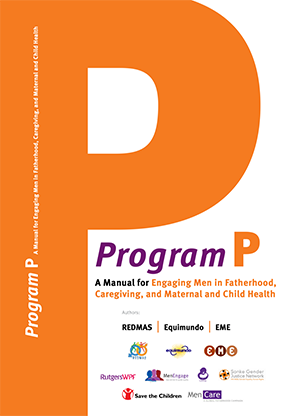
Program P: A Manual for Engaging Men in Fatherhood, Caregiving, and Maternal and Child Health
Program P (“P” for “padre” in Spanish and “pai” in Portuguese, meaning “father”) provides concrete strategies for engaging men in active caregiving from their partner’s pregnancy through their child’s early years. It identifies best practices on engaging men in maternal and child health, caregiving, and preventing violence against women and children. The manual was developed for use by health workers, social activists, nonprofit organizations (or nongovernmental organizations), educators, and other individuals and institutions that aim to use “men as caregivers” as a starting point for improving family well-being and achieving gender equality.
Organization/author: "Equimundo, Fundación CulturaSalud/EME, Network of Men for Gender Equality "
Year: 2013Language: Russian, Portuguese, Arabic, Spanish, English
 Know Know about FP/SRH by having factual knowledge about FP/SRH services and methods and harmful gender norms and expectations.
Know Know about FP/SRH by having factual knowledge about FP/SRH services and methods and harmful gender norms and expectations. Care Care about FP/SRH by assuming responsibility for their personal health and reproduction and accountability for supporting their partners’ reproductive priorities and needs.
Care Care about FP/SRH by assuming responsibility for their personal health and reproduction and accountability for supporting their partners’ reproductive priorities and needs. Do Do supportive actions for FP/SRH by taking concrete steps to communicate and help achieve reproductive intentions and goals from themselves and in support of their partners.
Do Do supportive actions for FP/SRH by taking concrete steps to communicate and help achieve reproductive intentions and goals from themselves and in support of their partners.

